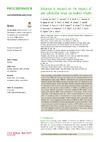Identificador persistente para citar o vincular este elemento:
https://accedacris.ulpgc.es/jspui/handle/10553/55128
| Título: | Advances in research on the impacts of anti-submarine sonar on beaked whales | Autores/as: | Bernaldo De Quirós, Y. Fernández Rodríguez, Antonio Jesús Baird, R. W. Brownell, R. L. Aguilar De Soto, N. Allen, D. Arbelo, M. Arregui Gil, Marina Costidis, A. Fahlman, A. Frantzis, A. Gulland, F. M.D. Iñíguez, M. Johnson, M. Komnenou, A. Koopman, H. Pabst, D. A. Roe, W. D. Sierra, E. Tejedor, M. Schorr, G. |
Clasificación UNESCO: | 3109 Ciencias veterinarias | Palabras clave: | Beaked Whales Sonar Stranding Decompression Sickness Naval Exercises |
Fecha de publicación: | 2019 | Editor/a: | 0962-8452 | Proyectos: | Patologia Embolica (Gaseosa/Grasa) en Cetaceos (Pegcet-3) Red Macaronésica de transferencia de conocimientos y tecnologías interregional y multidisciplinar para proteger, vigilar y monitorizar los cetáceos y el medio marino, y analizar y explotar de forma sostenible la actividad turística asociada |
Publicación seriada: | Proceedings of the Royal Society B: Biological Sciences | Resumen: | Mass stranding events (MSEs) of beaked whales (BWs) were extremely rare prior to the 1960s but increased markedly after the development of naval mid-frequency active sonar (MFAS). The temporal and spatial associations between atypical BW MSEs and naval exercises were first observed in the Canary Islands, Spain, in the mid-1980s. Further research on BWs stranded in association with naval exercises demonstrated pathological findings consistent with decompression sickness (DCS). A 2004 ban on MFASs around the Canary Islands successfully prevented additional BW MSEs in the region, but atypical MSEs have continued in other places of the world, especially in the Mediterranean Sea, with examined individuals showing DCS. A workshop held in Fuerteventura, Canary Islands, in September 2017 reviewed current knowledge on BW atypical MSEs associated with MFAS. Our review suggests that the effects of MFAS on BWs vary among individuals or populations, and predisposing factors may contribute to individual outcomes. Spatial management specific to BW habitat, such as the MFAS ban in the Canary Islands, has proven to be an effective mitigation tool and mitigation measures should be established in other areas taking into consideration known population-level information. | URI: | https://accedacris.ulpgc.es/handle/10553/55128 | ISSN: | 0962-8452 | DOI: | 10.1098/rspb.2018.2533 | Fuente: | Proceedings of the Royal Society B: Biological Sciences[ISSN 0962-8452],v. 286 (1895) |
| Colección: | Artículos |
Citas SCOPUSTM
86
actualizado el 08-jun-2025
Citas de WEB OF SCIENCETM
Citations
76
actualizado el 22-feb-2026
Visitas
82
actualizado el 11-ene-2026
Descargas
38
actualizado el 11-ene-2026
Google ScholarTM
Verifica
Altmetric
Comparte
Exporta metadatos
Los elementos en ULPGC accedaCRIS están protegidos por derechos de autor con todos los derechos reservados, a menos que se indique lo contrario.
